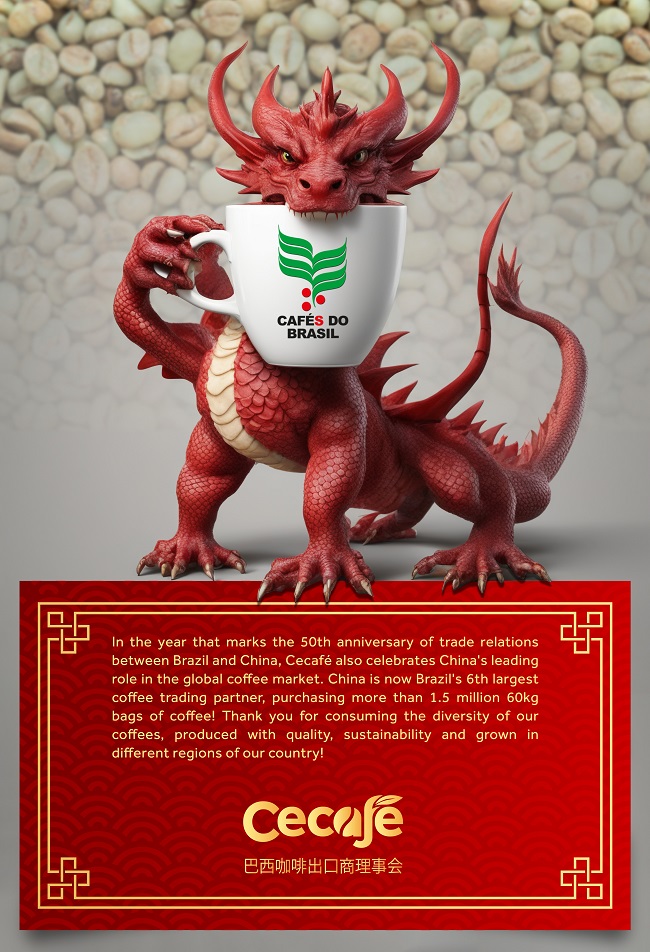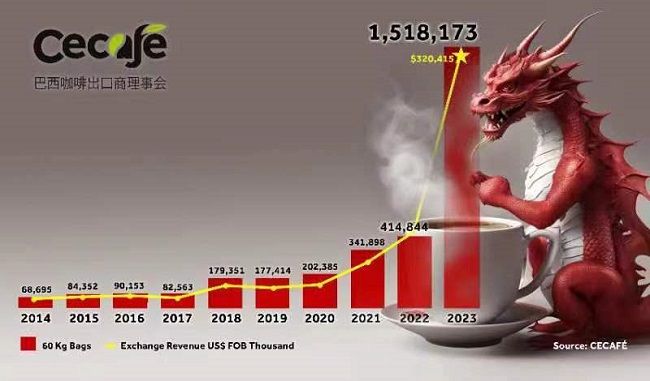50 years of Brazil-China relations: world coffee powers united by sustainability and quality

China is emerging in the global coffee market with significant potential for increased demand, reflecting a new cultural dimension of the new generations. Overtaking the United States as the world's largest market for branded coffee shops, China now has approximately 50,000 stores, expanding opportunities and bolstering the beverage's attributes.
In 2024, China and Brazil will celebrate 50 years of growing bilateral diplomatic and economic relations. The union of the two countries in the coffee market is evident in the strong ties for sustainability, quality and diversity of the beverage that Brazil offers to consumers in Asia's leading economy and the world's second largest.
A continental country with some 40 coffee-growing regions within its territory, Brazil is the world's leading producer and exporter of coffee. The diversity of environments and qualities, the continuous investment in research and innovation, the good agricultural practices applied on farms, and the organization and efficiency of the entire production chain are the cornerstones of the sustainability of Brazilian coffee.
Brazil's coffee history spans almost three centuries. In celebration of the 50th anniversary of China-Brazil relations, Brazil is preparing to strengthen the presence of its coffee in Chinese coffee shops.
The latest data collected by the Brazilian Coffee Exporters Council (Cecafé) shows that China has emerged as one of the top destinations for Brazilian coffee.
China jumped to sixth place in the ranking of Brazil's top coffee trading partners in 2023, importing more than 1.5 million 60kg bags of coffee, representing a significant growth of 278.5 percent compared to the previous year. Compared to the last decade, the volume exported in 2023 is 22 times higher than what China purchased in 2014.

Needless to say, exports to China are incredibly important for Brazilian coffee.
For this reason, in recent years, Cecafé has worked with the Mellower coffee chain and the Brazilian Embassy in Beijing to promote Brazil's image. Past editions of the "Brazilian Coffee Month in China" have been a success in different metropolitan regions.
This year, in partnership with a large Chinese coffee company and coffeehouse chain, another major project is underway to promote Brazilian coffee. The action will spread the message of the sustainability of Brazilian coffee to Chinese consumers through communication actions and personalized videos, as well as, on another front, welcoming business and technical missions to Brazil's coffee regions.
Based on the relationship of trust and friendship between the countries, Cecafé continues to follow ESG trends and seeks to demonstrate sustainability by verifying the socio-environmental performance of Brazilian production, allowing transparency and credibility in demonstrating compliance with the parameters required by the legislation of different countries and demanding global markets.
For this purpose, Cecafé launched the "Brazil Coffees" traceability platform, developed by Serasa Experian.
Brazil has numerous public and official databases that evaluate and monitor socio-environmental issues. One of the cornerstones of the tool is the Rural Environmental Registry (CAR), which is mandatory for all rural farmers according to the Brazilian Forest Code, resulting in the collection of polygons and geo-referenced data.
Based on the geolocation of all Brazilian coffee growers, the necessary assessments are made using remote sensing technology, such as the satellite images obtained from available satellite constellations. This makes it possible to analyze the current level of forest conservation, agricultural crops in the field, and deforestation, with rapid and immediate assessment (real time) in the agricultural regions.
It is therefore a matter of applying cutting-edge technology so that the Brazilian coffee sector can achieve greater global recognition for its efforts, work, progress and concrete socio-environmental results.
Together with other programs currently being carried out by Cecafé, such as the Digital Farmer, the Annual Multi-Residue Coffee Monitoring, the Carbon Balance, as well as social and educational actions to mitigate inappropriate working conditions in farms, among others, Brazil is ready to lead the ESG agenda and continue to be the world's top coffee trading partner.
This is the commitment of the Brazilian coffee export sector to the socio-environmental agenda, strengthening the bonds of unity for sustainability through diversity and quality, and delivering environmentally and socially responsible coffees to the entire world, especially to the emerging coffee market in China.








